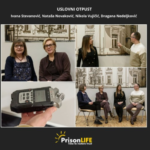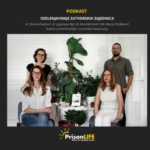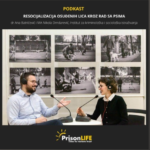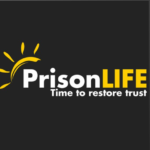Criminal Speech or Criminal Slang
 This is a specific type of language used by certain criminal groups to conceal the content of their communication. Examples such as ‘tvorza’, ‘spid’, ‘ideš za kanadu’, ‘ćuza’, ‘cvekla’ are instances where words are either created, rearranged, or borrowed from other languages. But beyond being a secret code, perhaps the most important function of criminal argot is its identity-forming role. Such language maintains the identity of a group, fostering a sense of community and reducing tension within the group. Especially in a prison context, it also serves to differentiate between groups (petty criminals from major criminals, drug addicts, perpetrators of specific types of crimes, etc.). Interestingly, criminal slang often seeps into everyday language, likely due to people’s fascination with crime.
This is a specific type of language used by certain criminal groups to conceal the content of their communication. Examples such as ‘tvorza’, ‘spid’, ‘ideš za kanadu’, ‘ćuza’, ‘cvekla’ are instances where words are either created, rearranged, or borrowed from other languages. But beyond being a secret code, perhaps the most important function of criminal argot is its identity-forming role. Such language maintains the identity of a group, fostering a sense of community and reducing tension within the group. Especially in a prison context, it also serves to differentiate between groups (petty criminals from major criminals, drug addicts, perpetrators of specific types of crimes, etc.). Interestingly, criminal slang often seeps into everyday language, likely due to people’s fascination with crime.
PrisonLIFE Podcast – Episode Six
 In the second part of the podcast, we talk about a collection of papers on the topic of women’s perspective in prisons (editors: Prof. Sanja Ćopić and Dr. Ana Batrićević). The papers concern the historical and then the current regional and local perspective in prisons. A special review is also made on the quality of life in prisons in Serbia, issues of motherhood and political prisoners.
In the second part of the podcast, we talk about a collection of papers on the topic of women’s perspective in prisons (editors: Prof. Sanja Ćopić and Dr. Ana Batrićević). The papers concern the historical and then the current regional and local perspective in prisons. A special review is also made on the quality of life in prisons in Serbia, issues of motherhood and political prisoners.
PrisonLIFE Podcast – Episode Five (Part Two)
 In the first part of the fifth episode, we discuss the specificities of women’s crime, which, as Professor Sanja Ćopić points out, maintains traditional gender roles. Criminal offenses typically involve property crimes due to existential needs and less independence, or on the other hand, from a position of previous victimization and violence. However, what has been noticed in our country recently is a decrease in crimes of killing abusers. On the other hand, there is an increase in drug-related crimes – a trend that is also present globally
In the first part of the fifth episode, we discuss the specificities of women’s crime, which, as Professor Sanja Ćopić points out, maintains traditional gender roles. Criminal offenses typically involve property crimes due to existential needs and less independence, or on the other hand, from a position of previous victimization and violence. However, what has been noticed in our country recently is a decrease in crimes of killing abusers. On the other hand, there is an increase in drug-related crimes – a trend that is also present globally
PrisonLIFE Podcast – Episode Five (Part One)
 Conditional release, a legal mechanism allowing an individual to be released from prison before the completion of their sentence, is the topic of our fourth podcast.
Conditional release, a legal mechanism allowing an individual to be released from prison before the completion of their sentence, is the topic of our fourth podcast.
To qualify for conditional release, among other things, the convicted person must demonstrate motivation for change and good behavior.
Most convicted individuals are motivated to participate in treatment involving various specialized programs, work engagement, education, and artistic sections, emphasized Dragana Nedeljković, a special educator in the treatment service at the Sremska Mitrovica Correctional Institution. Resistance in work is not resistance to treatment but resistance to the uncertainty of change.
Nataša Novaković, Head of the Human Rights and Criminal Justice System Unit at the OSCE Mission to Serbia, advocates for the positive effects of conditional release and the need to reintroduce it as a measure of motivation for convicts. The success of conditional release is inseparably linked to the post-penal acceptance of convicts, i.e., better contact with the local community, which is facilitated by both governmental and non-governmental organizations.
While there is an effort to establish dialogue among different institutions, there is also a tightening of penal policy – life imprisonment has been introduced, special rules for determining the length of imprisonment for repeat offenders, and a reduced number of approved conditional releases by the court, as noted Dr Ivana Stevanović and Dr Nikola Vujičić from the Institute of Criminological and Sociological Research.
PrisonLIFE – Podcast – fourth podcast
I n the third episode, we discussed the project of greening prison communities, a topic explored by the authors from the Institute for Criminological and Sociological Research in their monograph ‘Encounter of Social and Biological: Greening Prison Communities’.
n the third episode, we discussed the project of greening prison communities, a topic explored by the authors from the Institute for Criminological and Sociological Research in their monograph ‘Encounter of Social and Biological: Greening Prison Communities’.
Dr Olivera Pavićević reflected on the leitmotif of the entire theme by asking how to transition from a bare existence to a life worth living. The question was raised on how to enable the convicted person to see their life not as mere survival and adaptation from one worse cycle to another but to return a higher value to life, which could be provided through a different interaction with living beings, among other things, by greening.
Dr. Ljeposava Ilijić elaborated on what green programs mean in prisons and criminology, emphasizing the contrast between former prison architecture and modern innovations. Green programs include different architecture, greening, horticulture, animal-assisted programs, and beekeeping… thus embodying a message that promotes responsibility for living beings, cooperativeness, a sense of usefulness and ability, and restoring trust to both the convicted persons and the community.
Dr Ana Batrićević shared her experience in field visits to prisons in Serbia, whose contrast of greyness and greenery aims to restore hope to those who reside there and those who work there. In addition to sharing some personal experiences that convicted individuals have shared with her, whose impressions from the project are very positive, Ana also presented previous lines through photography, sharing it with us both in the monograph and on social media.
PrisonLIFE – Podcast – Third podcast
Resocialization of Convicts through Dog Therapy
 In the second episode, we discussed the project of resocializing convicts through dog therapy.
In the second episode, we discussed the project of resocializing convicts through dog therapy.
Dr Ana Batrićević shared her experiences and photos taken during the project. The essential takeaway from Ana’s experience with this project is hope – through working with dogs, she felt that hope for change can emerge even in the most challenging circumstances, offering a bright perspective for resocialization.
PrisonLIFE – Podcast – Second Eposode
 In the first episode, we discussed some basic information about our PrisonLIFE project, which aims to understand the contemporary experience of serving a prison sentence, its objective assessment, and comprehensive improvement.
In the first episode, we discussed some basic information about our PrisonLIFE project, which aims to understand the contemporary experience of serving a prison sentence, its objective assessment, and comprehensive improvement.
Dr Milena Milićević introduced the project, while Nikola Drndarević and Dr Janko Međedović talked about previous research as well as the main instrument we use to measure the quality of prison life. Dr Olivera Pavićević and Dr Ljeposava Ilijić shared their knowledge and experience about the prison social climate.
